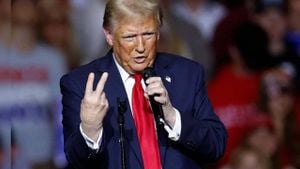Escalation on the Korean Peninsula has reached alarming heights as North Korea, under the leadership of Kim Jong Un, moves closer to integrating its military activities with Russia, particularly amid Russia's protracted conflict with Ukraine.
North Korea has taken significant steps recently, highlighting its strengthening military ties with Russia. Kim Jong Un has ordered the rapid mass production of explosive drones, signaling his intention to bolster the North's military capabilities, particularly as tensions with the United States and its allies increase. During high-profile inspections, Kim emphasized the need for North Korea to develop its drone manufacturing processes, underscoring the role these unmanned aerial vehicles (UAVs) will play in the nation’s military future.
U.S. military experts have raised concerns, noting the significance of such developments. The increasing sophistication and number of drones being produced may soon impact the balance of power both regionally on the Korean Peninsula and globally wherever North Korean military influences are felt. To this end, North Korean engineers and military personnel have reportedly been working around the clock to meet Kim's ambitious production goals.
Meanwhile, the geopolitical ramifications of North Korea's collaboration with Russia have not gone unnoticed. Following the signing of the Treaty on Comprehensive Strategic Partnership between the two nations this past June, North Korea has started deploying troops to Russia to assist with military operations against Ukraine. Reports indicate around 10,000 North Korean troops are currently stationed predominantly in the Kursk region of Russia to partake in conflict operations alongside Russian forces.
This deployment marks not just a military alliance, but hints at North Korea's pivot away from negotiations previously held with the U.S. during the Trump administration. Following unresolved discussions with the then-President, Kim has shifted North Korea's focus toward strengthening ties with both Russia and China, and distancing from the U.S.'s influence.
During talks held on the sidelines of the APEC summit, U.S. Secretary of State Antony Blinken and South Korean Foreign Minister Cho Tae-yul expressed deep concerns about the ramifications of North Korean troops assisting Russian forces. The collaboration is seen not merely as regional instability, but as potentially altering the dynamics of security on two different continents. The ministers labeled this growing military cooperation between North Korea and Russia as threatening to both the Indo-Pacific and European security landscapes, insisting on rigorous engagement to mitigate these risks.
Adding another layer of complexity to the situation, the relationship between South Korea and Japan is witnessing positive shifts as both nations aim to confront the growing threat from North Korea collectively. Cho and his Japanese counterpart, Takeshi Iwaya, took the opportunity during the APEC meeting to outline their shared commitment to handle the existing issues exacerbated by Pyongyang's military actions.
While the backdrop of historical enmity remains, the importance of trilateral cooperation—bringing together the U.S., South Korea, and Japan—seems to be emphasized now more than ever. The leaders are collaborating closely to devise strategies to respond effectively to North Korea’s aggressive stance, indicating they will not stand idly by as tensions rise.
Throughout these developments, the narrative from defectors who once served within North Korea's military has started to resonate outward. They have begun to deliver heart-wrenching messages and information aiming to sway the morale of North Korean troops deployed alongside Russia, encouraging acts of defiance against their current commands.
Despite the apparent collaboration, the North Korean regime continues to face its internal struggles. Economically isolated and limited by international sanctions, there are doubts over whether its military build-up can sustain itself. Analysts, including Park Hyeong-jung from the Korea Institute for National Unification, suggest North Korea is aiming to garner support from Moscow, perhaps trading munitions for advanced military technologies, thereby possibly upgrading its own arsenals significantly.
Moscow’s alteration of focus amid its military endeavors against Ukraine raises questions about its willingness to support Pyongyang fully. Analysts speculate this could soon lead to negotiating stronger military exchanges between the two nations, consolidifying the military entanglements presently being formed.
Overall, the situation appears precarious, with no clear respite on the horizon. The involvement of North Korean forces could herald new conflicts beyond the traditional battle lines, risking broader war scenarios. Meanwhile, the swift development of drone technologies under Kim's direction may not only redefine North Korea's tactical options but also alarm its neighboring nations. The stance of international powers remains watchful, desperate to curb the threat of expanded conflict and the potential destabilization of the region.
With both the U.S. and its allies focused intently on these shifts, the coming weeks will likely reveal how deeply intertwined the fates of North Korea and Russia may become, and how this partnership will reshape the balance of power across continents.



